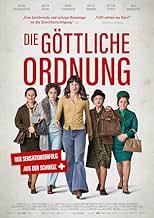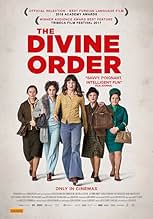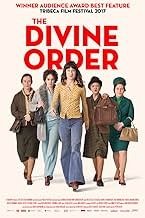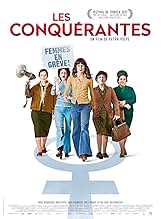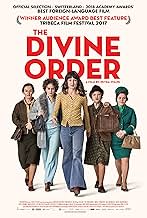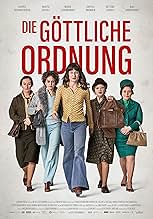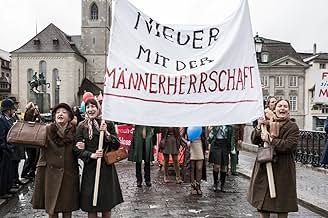VALUTAZIONE IMDb
7,1/10
3212
LA TUA VALUTAZIONE
Nel 1971, una giovane casalinga si organizza con le donne del suo paese per chiedere il diritto di voto.Nel 1971, una giovane casalinga si organizza con le donne del suo paese per chiedere il diritto di voto.Nel 1971, una giovane casalinga si organizza con le donne del suo paese per chiedere il diritto di voto.
- Regia
- Sceneggiatura
- Star
- Premi
- 14 vittorie e 11 candidature totali
Maximilian Simonischek
- Hans
- (as Max Simonischek)
Recensioni in evidenza
Nothing spectacular. None of the over-the-top lambastadry you'd normally expect of a movie dealing with such a passionate subject. Just the truth. True feelings, true conflicts, true discovery. What could otherwise have been just another "me too" movie was done with such aplomb that it really managed to impress its message into the souls of the viewers.
I wonder now, in retrospect, if women's rights were another (perhaps major) facet of why "the west" was (and in many realms still is) so against socialism - which in its very fundament deems men and women to be equal?
I wonder now, in retrospect, if women's rights were another (perhaps major) facet of why "the west" was (and in many realms still is) so against socialism - which in its very fundament deems men and women to be equal?
I just came from seeing this movie at the Tribeca Film Festival. What a treat. I wanted to see it because it seemed incredible that the Swiss did not grant women the right to vote until the 1970's. How could such a country be so backward on women/human rights. Women were not allowed to vote, open their own bank accounts, or take a job without the permission of their husbands. Amazing! The acting was so natural and the cause so relevant today when women's rights are still under attack. One of the best movies with a message that I have seen in a long time. Brought back many memories I had of the women's movement in the U.S. in the 70's. Wonderful talk back after the movie with the director and some of the actresses.
Hopefully this summary line is not missunderstood, but here we go with what I mean, if you're interested -> don't cry, but rather act. As far as women movements go and oppression of women, there are a lot of stories that can be told (unfortunately, but let's hope we move forward and people will look at this and other movies and question a lot of things).
This is just one of them and as one other reviewer wrote, he/she felt reminded about another movement closer to the reviewers heart. Which makes sense and is what the movie aims to do. While the characters in the movie are divided and it may feel like a fight, the movie itself is rather uniting us the viewers. At least those who understand the message of course and don't feel differently. Having said that, the story is really engaging and it moves with an impeccable pace overall. More than decent and well done
This is just one of them and as one other reviewer wrote, he/she felt reminded about another movement closer to the reviewers heart. Which makes sense and is what the movie aims to do. While the characters in the movie are divided and it may feel like a fight, the movie itself is rather uniting us the viewers. At least those who understand the message of course and don't feel differently. Having said that, the story is really engaging and it moves with an impeccable pace overall. More than decent and well done
I assume that the characters in "The Divine Order" were not based on real people, as the filmmakers surely would have indicated this was the case. However, it doesn't matter too much, as the story is based on women's push for suffrage in Switzerland...the last of the industrialized nations to grant this freedom.
The film is set in a small town in Switzerland in 1971. Women's rights are pretty much unknown to this part of the world and folks just seem to accept that it's God's plan for men to be in charge. However, slowly two women manage to convince the rest of the ladies in town that their cause is just...but they really need to convince the men since they are the ones who need to vote in favor of this.
While this story could have come off as angry or anti-male, it's really not...but more about just giving the women an even break. It also accentuates how beneficial this could be for the men...without being preachy. Well worth seeing and very well written, acted and directed.
The film is set in a small town in Switzerland in 1971. Women's rights are pretty much unknown to this part of the world and folks just seem to accept that it's God's plan for men to be in charge. However, slowly two women manage to convince the rest of the ladies in town that their cause is just...but they really need to convince the men since they are the ones who need to vote in favor of this.
While this story could have come off as angry or anti-male, it's really not...but more about just giving the women an even break. It also accentuates how beneficial this could be for the men...without being preachy. Well worth seeing and very well written, acted and directed.
The Swiss film Die göttliche Ordnung was shown in the U.S. with the translated title, The Divine Order (2017). The movie was written and directed by Petra Biondina Volpe. The film stars Marie Leuenberger as Nora, a wife and mother living in a small Swiss rural city.
Nora would like to work outside the home, but for this she needs her husband's permission. Starting with this revelation, we quickly learn that the society is incredibly patriarchal. The key point is that women can't vote. So, they can't change the rules that keep them down because they don't have the political authority to bring about change.
This change only came about because of women's work outside the system, using every tactic they could think of to get the system changed. (It did change, as we know. What I didn't know is that the last voting restriction against women didn't fall until 1991!)
In a movie like this, the quality rises or falls based on the work of the protagonist. Leuenberger is a experienced professional actor. She was superb in this role, and that isn't only my opinion. She won the best actress award in an international feature at the Tribeca Film Festival in NYC for her work in The Divine Order.
This isn't a perfect film. There are some obviously contrived situations, and some very predictable scenes.
It sounds strange, but the movie was sometimes difficult to watch. Switzerland in 1971 was so bizarrely out of synch with the rest of the developed world that the setting felt like a medieval kingdom rather than a rich, modern, industrialized nation. I kept waiting for William Tell to walk down the street with his crossbow.
I had to keep reminding myself, "This really happened. Swiss women truly couldn't vote. Many men--and some women--wanted to keep it that way."
We saw this interesting movie at Rochester's excellent Little Theatre. It was shown as part of the 2017 High Falls Film Festival--Celebrating Women in Film. It will work well on a small screen.
Nora would like to work outside the home, but for this she needs her husband's permission. Starting with this revelation, we quickly learn that the society is incredibly patriarchal. The key point is that women can't vote. So, they can't change the rules that keep them down because they don't have the political authority to bring about change.
This change only came about because of women's work outside the system, using every tactic they could think of to get the system changed. (It did change, as we know. What I didn't know is that the last voting restriction against women didn't fall until 1991!)
In a movie like this, the quality rises or falls based on the work of the protagonist. Leuenberger is a experienced professional actor. She was superb in this role, and that isn't only my opinion. She won the best actress award in an international feature at the Tribeca Film Festival in NYC for her work in The Divine Order.
This isn't a perfect film. There are some obviously contrived situations, and some very predictable scenes.
It sounds strange, but the movie was sometimes difficult to watch. Switzerland in 1971 was so bizarrely out of synch with the rest of the developed world that the setting felt like a medieval kingdom rather than a rich, modern, industrialized nation. I kept waiting for William Tell to walk down the street with his crossbow.
I had to keep reminding myself, "This really happened. Swiss women truly couldn't vote. Many men--and some women--wanted to keep it that way."
We saw this interesting movie at Rochester's excellent Little Theatre. It was shown as part of the 2017 High Falls Film Festival--Celebrating Women in Film. It will work well on a small screen.
Lo sapevi?
- QuizSwitzerland's submission to the Foreign Language Film Award of the 90th Annual Academy Awards.
- Colonne sonoreYou Don't Own Me
Written by John Madara (uncredited) and Dave White (uncredited)
Performed by Lesley Gore
I più visti
Accedi per valutare e creare un elenco di titoli salvati per ottenere consigli personalizzati
- How long is The Divine Order?Powered by Alexa
Dettagli
- Data di uscita
- Paese di origine
- Siti ufficiali
- Lingue
- Celebre anche come
- The Divine Order
- Luoghi delle riprese
- Aziende produttrici
- Vedi altri crediti dell’azienda su IMDbPro
Botteghino
- Lordo Stati Uniti e Canada
- 76.277 USD
- Lordo in tutto il mondo
- 195.081 USD
- Tempo di esecuzione1 ora 36 minuti
- Colore
- Proporzioni
- 2.35 : 1
Contribuisci a questa pagina
Suggerisci una modifica o aggiungi i contenuti mancanti

Divario superiore
By what name was Contro l'ordine divino (2017) officially released in Canada in English?
Rispondi


